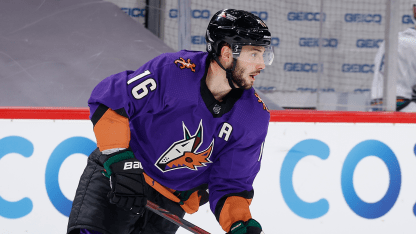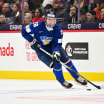On Wednesday, the Flyers announced the signing of 33-year-old center Derick Brassard to a one-year, $825,000 contract. A veteran of 905 regular season games and 117 matches in the Stanley Cup playoffs, Brassard is a versatile player who brings a competitive streak as well as considerable experience.
Instant Analysis: Flyers Sign Brassard
On Wednesday, the Flyers announced the signing of 33-year-old center Derick Brassard to a one-year, $825,000 contract.

By
Bill Meltzer
philadelphiaflyers.com
Brassard is yet another new addition to the team who is capable of adding to the leadership group in Philadelphia. He's the fourth player the Flyers have added during the offseason who has been an alternate captain in the NHL as recently as last season. Fellow new Flyers Ryan Ellis (with the Nashville Predators), Cam Atkinson (Columbus Blue Jackets), Rasmus Ristolainen (Buffalo Sabres), and Keith Yandle (Florida Panthers) also wore an A for their now-former teams in 2020-21.
Brassard, who will turn 34 on Sept. 22, is no longer the same caliber of player that he was in the prime of his career when, playing under head coach Alain Vigneault for the New York Rangers, he posted 60-point (including a career-high 41 assists) and 58-point (including a career-high 27 goals) seasons in a top-six lineup role in 2014-15 and 2015-16.
The 27-goal season was the only 20-plus goal season of his career, as he's typically been more of a pass-first player. When he does elect to shoot, he's scored on 10.9 percent of his shots on goal for his career.
Since that time, the former Columbus first-round pick (sixth overall in 2006) has spent stints with the Ottawa Senators, Pittsburgh Penguins, a partial season with the Florida Panthers and a rental for the Colorado Avalanche, a bit of a bounceback year as a member of the New York Islanders in 2019-20 and a year with the Arizona Coyotes in the pandemic-affected 2020-21 campaign. As a member of the Coyotes this past season, Brassard posted eight goals and 20 points in 53 games.
Point production is not the whole story with Brassard. Even if he's slowing down offensively, he can contribute in some other ways.
The veteran has decent size (6-foot-1, 202 pounds) and uses it to engage in physical battles. He's been credited with 102 to a career-high of 137 hits in seven different seasons including 115 credited hits in 66 games (on top of 10 goals and 32 points) in a third-line role for the Islanders in 2019-20 before posting 39 hits in 18 playoff games.
Brassard also has a quick and active stick. From a statistical standpoint, he's often had an equal or higher number of credited takeaways compared to charged giveaways. In a typical 82-game NHL regular season, Brassard has averaged 37 takeaways to 35 giveaways. Over his 117 playoff games, he's been credited with 63 takeaways and charged with 58 giveaways.
From a deployment standpoint, Brassard has typically started the majority of his five-on-five shifts in the offensive zone (55.3 percent) although he started seeing more defensive zone deployment in his 30s during his time with the Penguins, Panthers and Avalanche. Brassard won 55.2 percent of his faceoffs as a member of the Islanders -- instant puck possession, in other words -- and 52.6 percent this past season as a member of the Coyotes.
Brassard is still an above-average skater, although he's perhaps lost a half step from early in his career due to the accumulated wear-and-tear. Nowadays, his ideal deployment is in the 13-to-15 minute range per game, as opposed to the 17-plus minutes he typically skated in his best years with the Blue Jackets and Vigneault's Rangers.
In addition to his instant familiarity with his new head coach, Brassard is being reunited with multiple players he knows well from previous NHL stops. He played together with Atkinson in Columbus. With the Rangers, Brassard was teammates with Kevin Hayes and Yandle. Yandle and Brassard also played together in Florida.
Are there any downsides to the Brassard signing? Potentially, yes.
Although his cap hit is minimal, the Flyers will have to do some salary cap management juggling before opening night rosters are filed with the NHL. As of now, the team will likely have to carry 13 forwards rather than 14.
Secondly, there is a risk of one or more of the team's forward prospects who are potentially NHL-ready -- such as Morgan Frost, Wade Allison, or Tanner Laczynski -- being blocked from an opening-night roster spot due to the numbers game. From a competition standpoint, there is also pressure on incumbent right winger Nicolas Aube-Kubel ($1.075 milllion AAV on his contract) to withstand a challenge for his job.
Ultimately, these things tend to sort themselves out. If it doesn't happen in training camp, performance and injury-related attrition usually changes the outlook from how things look before the start of the preseason.
At minimum, Brassard is a still-serviceable third-line center option for the short term. He is also capable of playing on a wing, although his career history has been one in which he's been more effective and seemingly a tad more comfortable in the middle than on a wing.
On Thu, Aug 26, 2021 at 9:15 AM Bill Meltzer wrote:
Instant Analysis: Flyers Sign Brassard
By Bill Meltzer. @BillMeltzer/PhiladelphiaFlyers.com
On Wednesday, the Flyers announced the signing of 33-year-old center Derick Brassard to a one-year, $825,000 contract. A veteran of 905 regular season games and 117 matches in the Stanley Cup playoffs, Brassard is a versatile player who brings a competitive streak as well as
Brassard is yet another new addition to the team who is capable of adding to the leadership group in Philadelphia. He's the fourth player the Flyers have added during the offseason who has been an alternate captain in the NHL as recently as last season. Fellow new Flyers Ryan Ellis (with the Nashville Predators), Cam Atkinson (Columbus Blue Jackets), Rasmus Ristolainen (Buffalo Sabres), and Keith Yandle (Florida Panthers) also wore an A for their now-former teams in 2020-21.
Brassard, who will turn 34 on Sept. 22, is no longer the same caliber of player that he was in the prime of his career when, playing under head coach Alain Vigneault for the New York Rangers, he posted 60-point (including a career-high 41 assists) and 58-point (including a career-high 27 goals) seasons in a top-six lineup role in 2014-15 and 2015-16.
The 27-goal season was the only 20-plus goal season of his career, as he's typically been more of a pass-first player. When he does elect to shoot, he's scored on 10.9 percent of his shots on goal for his career.
Since that time, the former Columbus first-round pick (sixth overall in 2006) has spent stints with the Ottawa Senators, Pittsburgh Penguins, a partial season with the Florida Panthers and a rental for the Colorado Avalanche, a bit of a bounceback year as a member of the New York Islanders in 2019-20 and a year with the Arizona Coyotes in the pandemic-affected 2020-21 campaign. As a member of the Coyotes this past season, Brassard posted eight goals and 20 points in 53 games.
Point production is not the whole story with Brassard. Even if he's slowing down offensively, he can contribute in some other ways.
The veteran has decent size (6-foot-1, 202 pounds) and uses it to engage in physical battles. He's been credited with 102 to a career-high of 137 hits in seven different seasons including 115 credited hits in 66 games (on top of 10 goals and 32 points) in a third-line role for the Islanders in 2019-20 before posting 39 hits in 18 playoff games.
Brassard also has a quick and active stick. From a statistical standpoint, he's often had an equal or higher number of credited takeaways compared to charged giveaways. In a typical 82-game NHL regular season, Brassard has averaged 37 takeaways to 35 giveaways. Over his 117 playoff games, he's been credited with 63 takeaways and charged with 58 giveaways.
From a deployment standpoint, Brassard has typically started the majority of his five-on-five shifts in the offensive zone (55.3 percent) although he started seeing more defensive zone deployment in his 30s during his time with the Penguins, Panthers and Avalanche. Brassard won 55.2 percent of his faceoffs as a member of the Islanders -- instant puck possession, in other words -- and 52.6 percent this past season as a member of the Coyotes.
Brassard is still an above-average skater, although he's perhaps lost a half step from early in his career due to the accumulated wear-and-tear. Nowadays, his ideal deployment is in the 13-to-15 minute range per game, as opposed to the 17-plus minutes he typically skated in his best years with the Blue Jackets and Vigneault's Rangers.
In addition to his instant familiarity with his new head coach, Brassard is being reunited with multiple players he knows well from previous NHL stops. He played together with Atkinson in Columbus. With the Rangers, Brassard was teammates with Kevin Hayes and Yandle. Yandle and Brassard also played together in Florida.
Are there any downsides to the Brassard signing? Potentially, yes.
Although his cap hit is minimal, the Flyers will have to do some salary cap management juggling before opening night rosters are filed with the NHL. As of now, the team will likely have to carry 13 forwards rather than 14.
Secondly, there is a risk of one or more of the team's forward prospects who are potentially NHL-ready -- such as Morgan Frost, Wade Allison, or Tanner Laczynski -- being blocked from an opening-night roster spot due to the numbers game. From a competition standpoint, there is also pressure on incumbent right winger Nicolas Aube-Kubel ($1.075 milllion AAV on his contract) to withstand a challenge for his job.
Ultimately, these things tend to sort themselves out. If it doesn't happen in training camp, performance and injury-related attrition usually changes the outlook from how things look before the start of the preseason.
At minimum, Brassard is a still-serviceable third-line center option for the short term. He is also capable of playing on a wing, although his career history has been one in which he's been more effective and seemingly a tad more comfortable in the middle than on a wing.


















